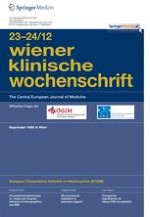01.12.2012 | case report
Therapeutic hypothermia for severe adult Herpes simplex virus encephalitis
Erschienen in: Wiener klinische Wochenschrift | Ausgabe 23-24/2012
Einloggen, um Zugang zu erhaltenSummary
Despite antiviral treatment and advances in critical care, the Herpes simplex encephalitis (HSE) still has a poor outcome in a significant portion of patients. In severe cases of HSE, reduced carbon dioxide reactivity is usually present and these patients don’t respond to the usual treatment of brain edema and intracranial hypertension. We present case series of patients with severe form of HSE treated with therapeutic hypothermia (TH) and describe in detail the indications, methods, and the rationale for its use.
In this case series, patients presented with severely impaired consciousness and very high predicted death rate as measured by Glasgow coma scale and Acute Physiology and Chronic Health Evaluation (APACHE II) score respectively. According to our findings, TH in carefully selected patients with HSE holds promise as an adjunctive to the antiviral treatment.
Anzeige
